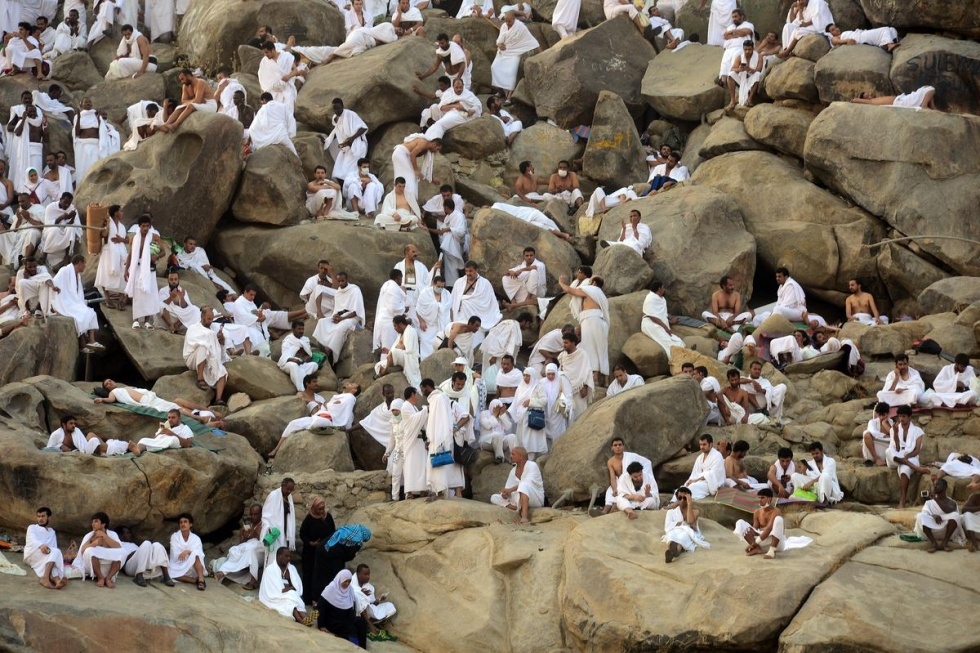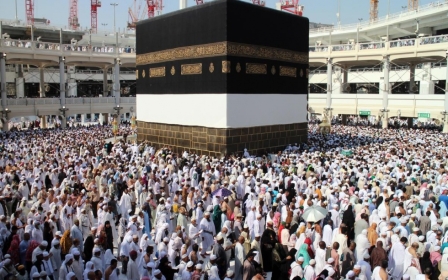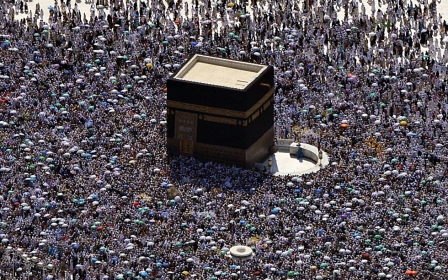Two million Muslims mark peak of hajj on Day of Arafat
The day of Arafat is the zenith of the Hajj where pilgrims, as well as Muslims around the world, focus on praying for forgiveness for their sins

Pilgrims gather on Mount Arafat, also known as Mount of Mercy, to take part in one of the Hajj rituals (AA)
Published date: 13 February 2015 01:15 GMT
|
Last update: 9 years 9 months ago
Tears flowed and prayers filled the air as the annual Muslim pilgrimage by almost two million believers from around the world reached its zenith Friday on a vast plain in western Saudi Arabia.
"I am now a newborn baby and I don't have any sin," Nigerian pilgrim Taofik Odunewu told AFP, tears streaming down his face.
He stood at the foot of Mount Arafat and raised his hands to the heavens in the seamless two-piece white "ihram" outfit of male pilgrims.
"I pray for prosperity, long life and... I pray for my country," Odunewu said with a broad smile on the second day of the hajj pilgrimage.
The hajj, which officially ends on Tuesday, is the world's largest Muslim gathering.
It is one of the five pillars of Islam that every capable Muslim must perform at least once, the high-point of his or her spiritual life.
Hundreds of thousands of pilgrims arrived at Arafat on Friday carrying suitcases and other luggage among thousands of white tents which stood ready to accommodate the multitude.
From early morning, pilgrims crowded onto the slippery, rocky hill where Prophet Mohammed is believed to have given his final sermon 14 centuries ago.
The pilgrims pushed forward to touch the rocks during prayer, their attire turning the hill, which is also known as Mount Mercy, white in colour.
All male pilgrims dress in white ihram to symbolise a state of purity, which also emphasises their unity regardless of social status or nationality.
Some pilgrims sat alone on the rocks, praying silently, but others gathered in groups, their voices in a loud appeal to God.
Egyptian pilgrim Mohammed Ahmed, 53, sat with his wife under a yellow garbage bag they set up as a make-shift tent.
He said they were praying for "the victory of Muslims, those who are weak, oppressed, and jailed... all over the world."
'This way, hajji'
Saudi Interior Minister Prince Mohammed bin Nayef said the hajj had attracted almost 1.4 million foreign pilgrims from 163 nations.
Local media report that several hundred thousand Saudis are also participating, pushing the total towards two million.
Security forces were deployed en masse across Mount Arafat and its plain to organise the wave of humanity.
"This way, hajji. Don't stop here. You're blocking the way," security men shouted through loudspeakers, trying to control the crowds.
"Sometimes we have difficulties understanding each others' languages, and mostly the elderly can't understand what we are saying," said Ali al-Shemmari, a soldier stationed at the hill.
"But things are going well," he said.
The number of faithful appeared lower than past years following a crackdown by authorities on illegal pilgrims without permits, more than 145,000 of whom have been turned away, the official Saudi Press Agency said.
Permits are a way of ensuring that such a large gathering with massive logistical challenges proceeds smoothly.
AFP reporters also said that crowd control appeared to have improved, with a smoother flow of pilgrims.
This year's hajj comes with Saudi Arabia and four other Arab nations joining Washington in air strikes against Islamic State group militants, who have committed a spate of atrocities in Syrian and Iraqi territory they seized.
"These criminals carry out rapes, bloodshed and looting," Saudi Arabia's top cleric said, without naming IS, during Friday prayers at Mount Arafat.
Grand Mufti Sheikh Abdul Aziz al-Sheikh called on Muslim leaders to "hit with an iron hand the enemies of Islam", whom he called a threat to the religion.
Saudi authorities are also striving to protect pilgrims from two deadly viruses, Ebola and the MERS coronavirus.
No such cases have been recorded among the hajj visitors, officials say.
At sunset, pilgrims were to set off for nearby Muzdalifah, where they gather pebbles for the symbolic "stoning of the devil" ritual on Saturday.
At the same time, animals will be slaughtered for Eid al-Adha, the feast of sacrifice celebrated by Muslims worldwide.
New MEE newsletter: Jerusalem Dispatch
Sign up to get the latest insights and analysis on Israel-Palestine, alongside Turkey Unpacked and other MEE newsletters
Middle East Eye delivers independent and unrivalled coverage and analysis of the Middle East, North Africa and beyond. To learn more about republishing this content and the associated fees, please fill out this form. More about MEE can be found here.




